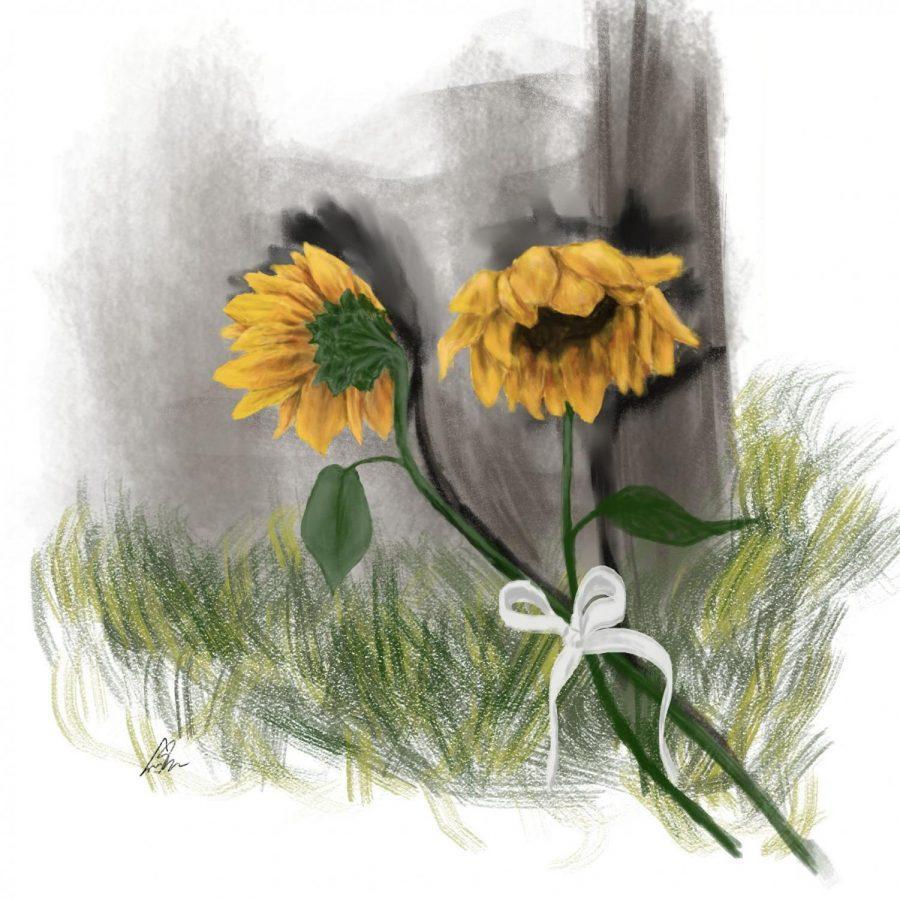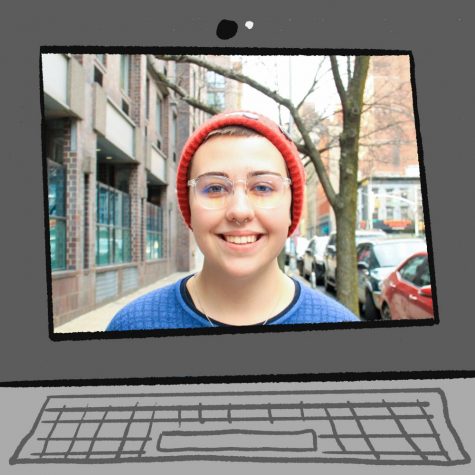Sunflowers
September 25, 2018
“I’ll meet you by the car in five,” I say, rushing through the door. We’re late to a cemetery service for my godfather.
The florist’s corner shop looks cozy and inviting in the midst of a quintessential February Moscow snow storm outside. The naughtiest flakelets glide down my cheeks and under the fluff of my scarf, as if they’re cold, too. My tears follow.
For a minute or so, I stand by the door, trying to calm myself. I don’t want to scare the lady behind the register with my shaky, hiccuping voice. Rare pedestrians pass me, staring into my red, glassy eyes with a careful subtleness. As I return their concerned looks, I think about that man on the subway the other day. His eyes red and tired, his breaths shallow, his hands shaky. I was quick to brush him off as “another drunk,” but now, I looked just like him. A wave of shame burned from inside me. He could’ve been struggling, grieving, like me. I should’ve approached him, but before I could dive deeper into that thought, I hear someone’s soft voice call out for me.
“Are you okay?” they ask.
The florist opens the door, the bell above ringing frantically in the heavy wind.
“Come in,” she suggests, hesitantly, looking at me with confusion. So I do.
“Can I please get two sunflowers?” I murmur.
The lady’s quick to get what I asked for. She packs both flowers separately, smacking an orange ribbon on top of each wrapper.
“Oh,” I sigh, again. “Would you mind putting them together?” I half-whisper, overcome with embarrassment.
“Oi…” the lady exhales, “I’m sorry, darling…” her voice drifting off.
I could almost feel the ellipsis hanging in the air. She re-packs the flowers. I pay, grab them and then throw a crumpled “thank you” at her as I rush through the door. It’s in Russian tradition to give those who are still alive an odd number of flowers, and, for those who have passed, to put an even amount on a grave. It’s been one, two, three, four, five, six, seven, eight, nine days since his passing.
…
I wake up early, hyperventilating. I anticipated this day since he passed. It’s in Russian tradition to mark half a year since a beloved’s death. Summer’s here; my cheeks are dry. All of the uncontrollable crying along with questioning his passing is left behind in the cold of the Russian winter. By now, we’ve worked out a routine. I leave the house five minutes before mum and dad. They follow, starting the car as I buy those unnecessary sunflowers from the florist. Seven hundred rubles spent on a gift for someone who can’t physically receive it. Seven hundred rubles spent on a gift you dread having to give.
I make my way to the florist’s corner shop, passing by a crowded playground, laughter ringing all around me. Inside, someone talks loudly. As I swing the door open, the lady behind the register quickly hangs up the phone, wiping the tears off of her cheeks.
“My apologies, dear. Would you like your … usual?” She smiles, her facial expression strained.
“Yes, please,” I nod. “Are you okay?”
I don’t know what else to say, realizing how awkward people must feel when I can’t hold back my tears in front of them.
“Sure, sure.” She looks up to the ceiling, averting eye contact and blinking away the redness in her eyes. “I now need two sunflowers packed together, too.”
I don’t say anything. What’s there to say? I pay for my sunflowers, murmuring, “I’m sorry for your loss,” as I promptly leave the shop.
The road to the cemetery feels familiar. Here’s the convenience store. Here’s the bus stop. Here’s the park with that dirty lake. Oh, and the cemetery gate. We slowly make our way to his grave, placing the sunflowers right underneath the photograph.
“Hey, you,” I say.
“Still don’t get it, why d’you need to make all of this mess?” mum critiques.
We stand there for a while, people chatting and burying our flowers with more and more bouquets. They talk about sunglasses and the colleges their kids are going to. They talk about some person’s birthday and recent hospital stays. As they go on and on, I stand there, swallowing my tears. Their conversations feel wrong. They need to stop, to be quiet, to respect his final resting place. I feel this ugly anger boiling deep inside of me. Mum takes my hand and squeezes it carefully.
“We gotta go, you guys,” she declares loudly.
We go around, hugging the living. Then, we leave. I don’t say a word. I’m mad. So mad. Mother gives me a tight hug before we get into the car.
“They grieve, too, darling,” she says softly.
When we arrive home, I rush to the convenience store to buy a gilded box of chocolates wrapped up with a bow. Then, I make my way to the florist’s corner shop. The lady behind the register isn’t crying anymore. Now, she’s staring blankly at the yellow wall in front of her.
“Hey,” I say loudly, wondering whether this confidence came along with the anger. “I got you something. In no way can it lessen your pain. But… you know… It’s chocolate!”
She gets up, accepting the box from my hands. Quietly, she gives me a long-lasting embrace over the counter, before I nod with respect and step outside, into the sunshine. It’s been one, two, three, four, five, six months since his passing.
…
I stand on the corner of a well-lit street. It’s been raining, so the neon signs are reflected in the wet pavement. Here’s the Rockefeller Center, here’s that hot-dog cart, here’s the over-crowded candy store. Last time I was here, he held my hand, scared that I might get lost among the restless pedestrians. I stand on the corner, my back pressed against the warm concrete wall. He got into a cab right here, and I crossed the street alone. But I can’t bring myself to do that now. It feels like I’m betraying him, like I’m rejecting this self-satisfying sadness.
I look around, holding back the tears. There’s a young woman in a burgundy pantsuit, drinking her morning coffee. Here’s an older gentleman, reading his newspaper on the bench, his silver curls sticking out from underneath his velvet hat. Next to him, there’s a little boy, holding a massive panda-shaped balloon in his left hand. I seem to be noticing the details today.
“Whether I’m still here tomorrow,” I whisper to myself, causing several people to stare at me with confused looks, “some young woman will still drink her morning coffee, an older gentleman will still read the news, that boy will still laugh as his balloon pushes through hot summer air.” Life doesn’t stop for anything. The sun will still rise tomorrow, it doesn’t know or care that he’s gone. No one else stopped living the moment he did.
And these people? They don’t know that he’s gone. They don’t know why I’m mumbling to myself. They can cross this street.
I breathe in, pulling myself away from the wall. It’s the glowing man on the pedestrian light display, so I have to cross. I step forward. He stays behind, catching that cab in the cool, December air. I wave goodbye, with a huge smile across my face. At that moment, I didn’t know that I will never see him again. It’s been nine months since his passing. It’s going to be many more, but I’ll learn to cross the streets we once crossed together on my own.
Email Anna-Dmitry Muratova at [email protected].























































































































































